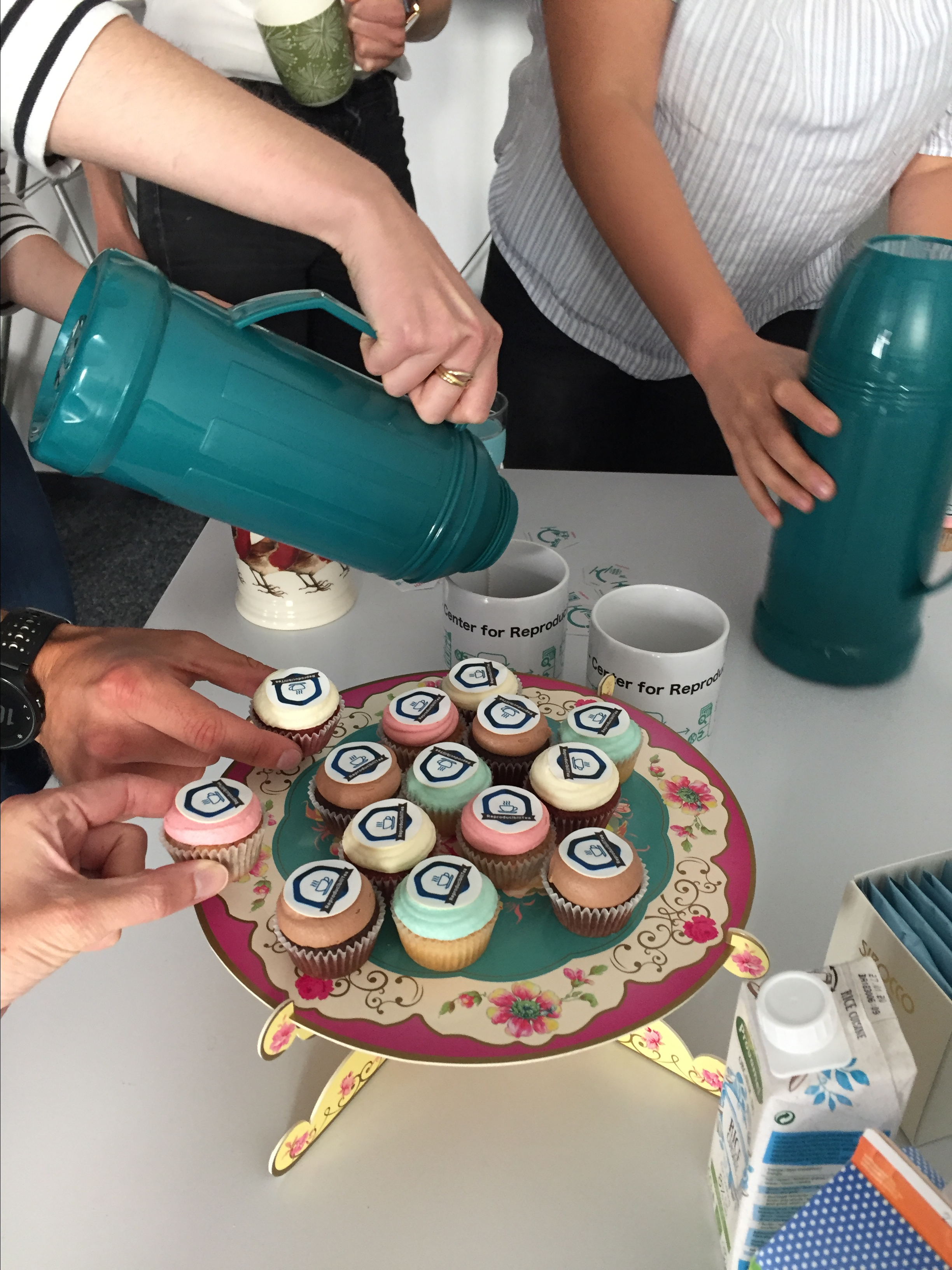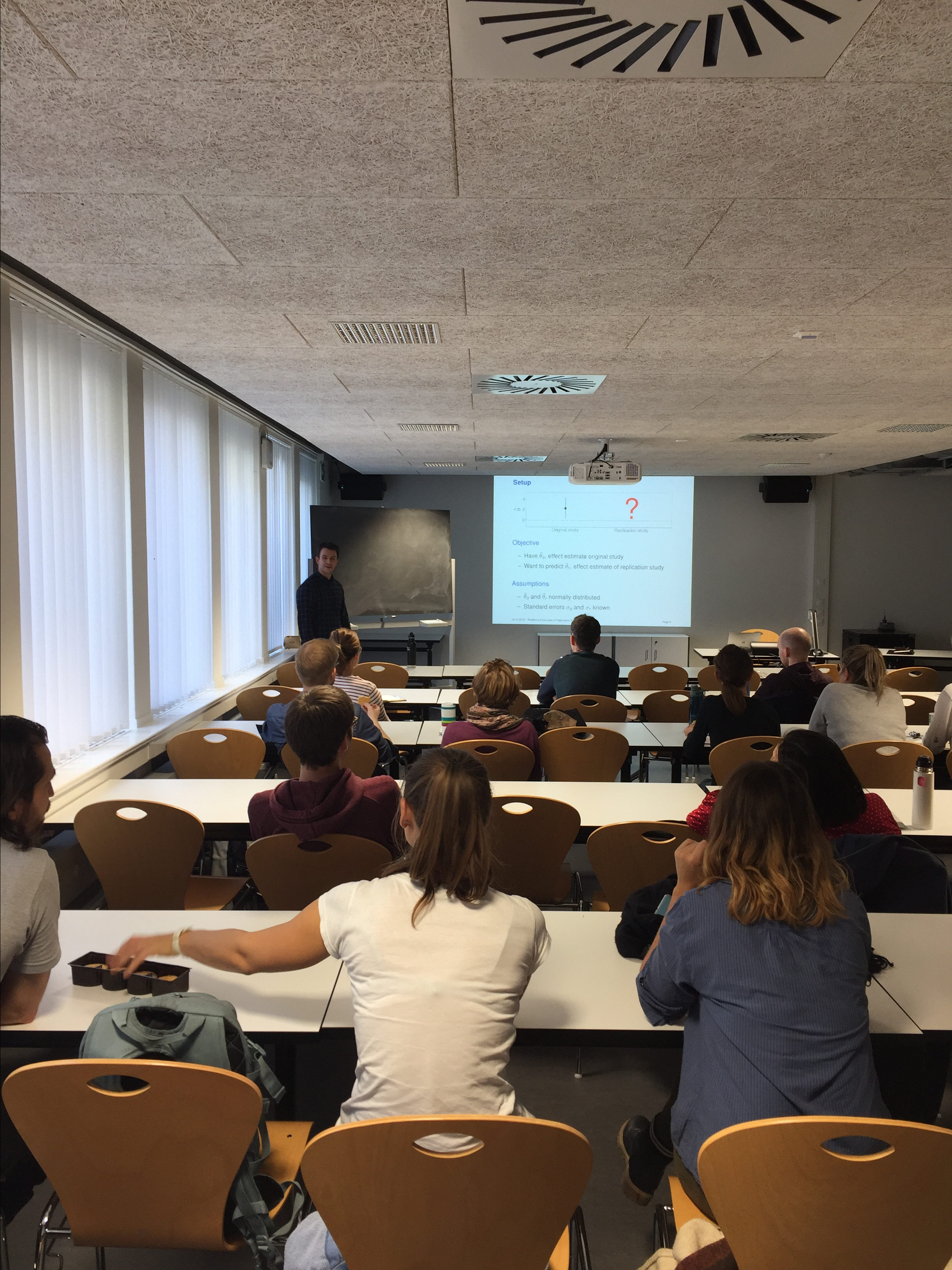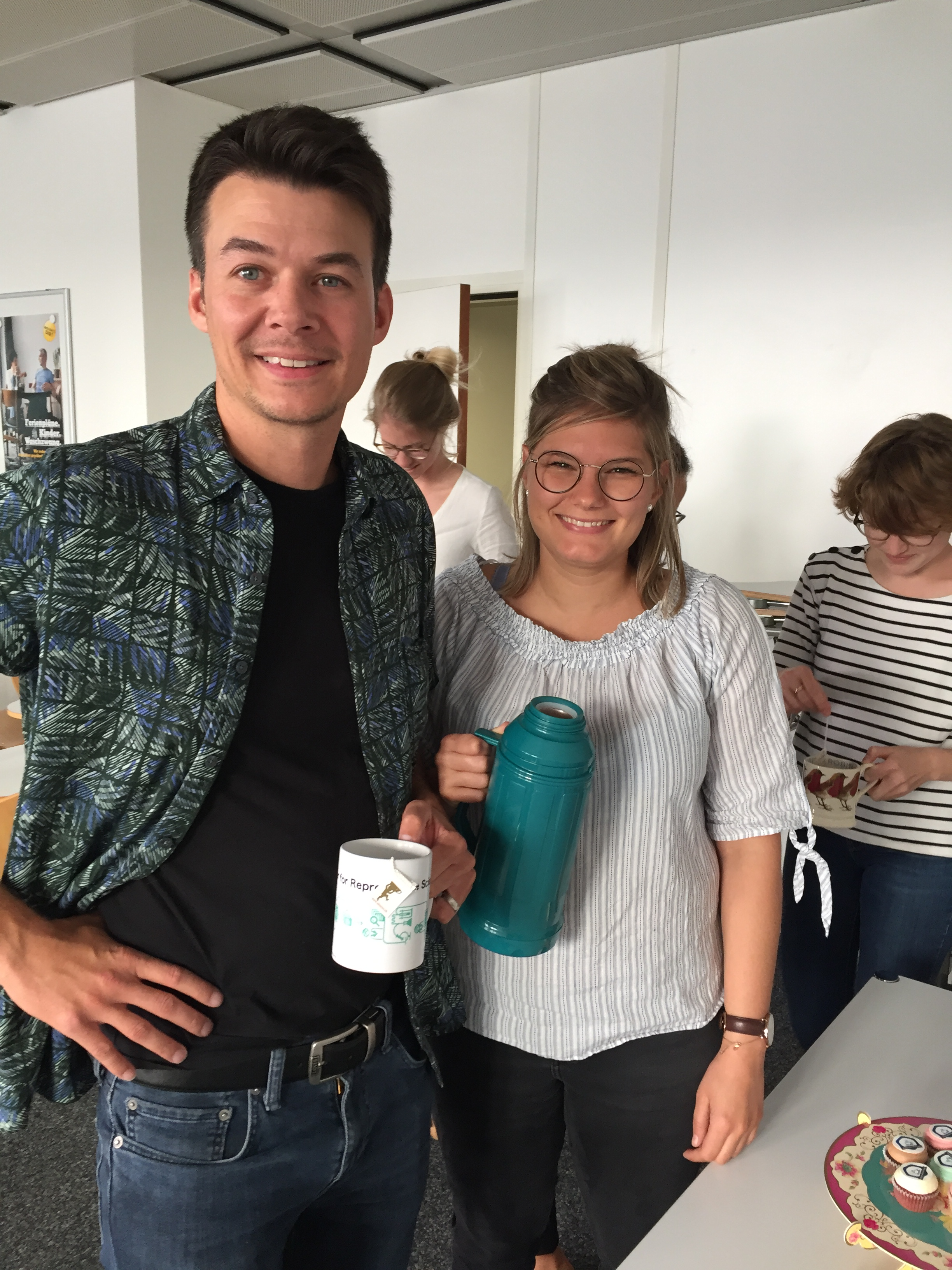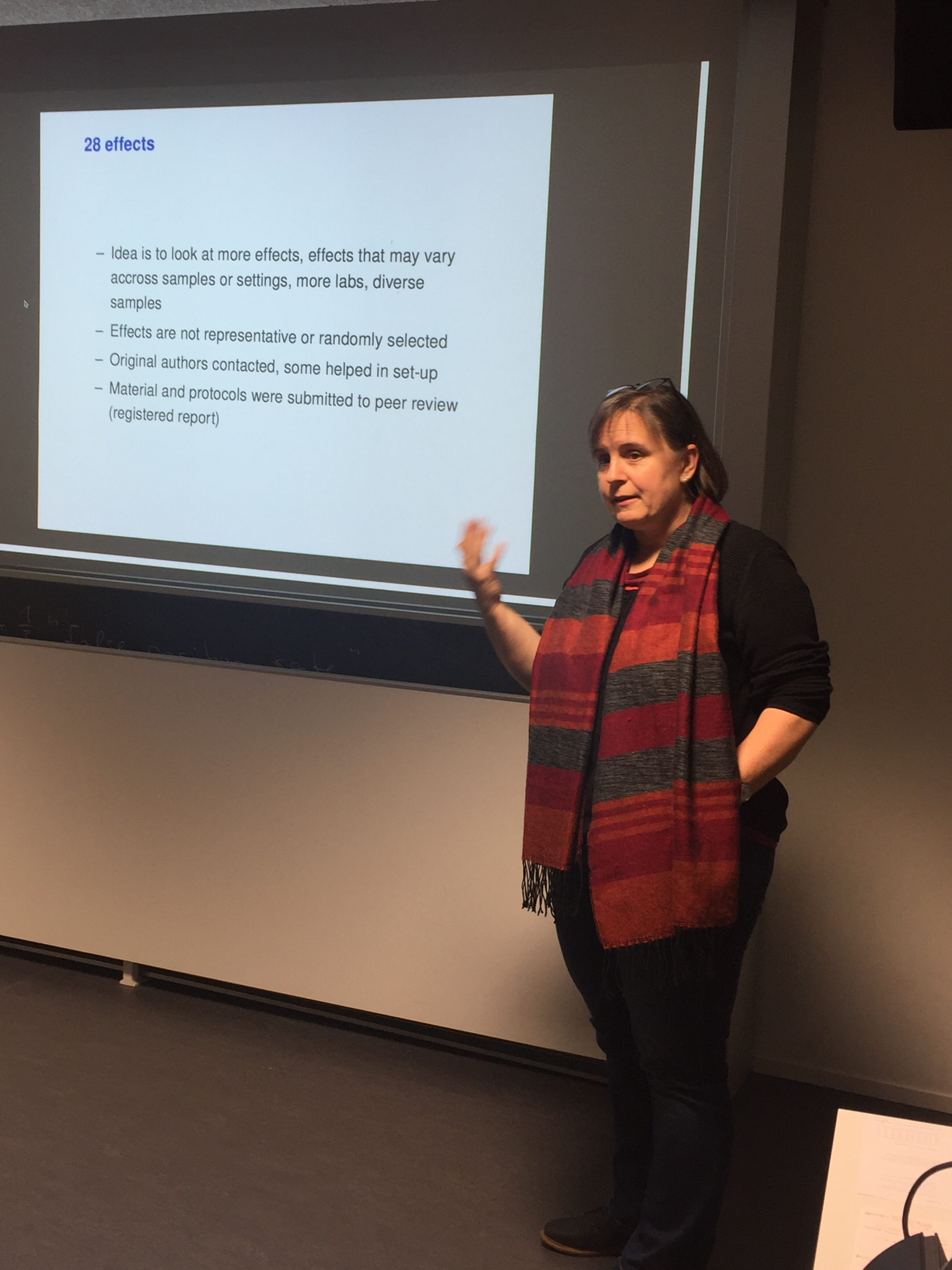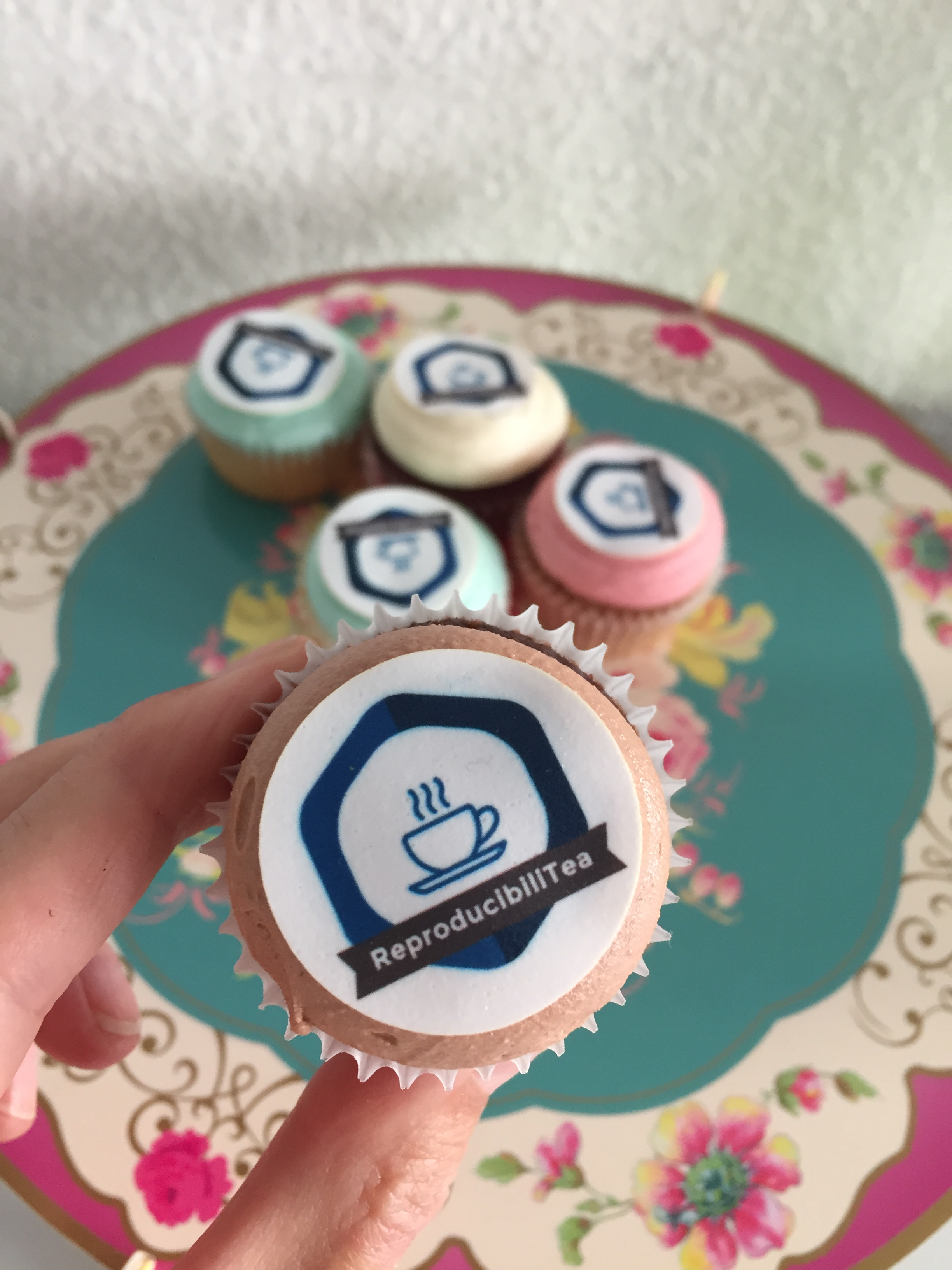ReproducibiliTea Journal Club
The ReproducibiliTea is a journal club dedicated to topics related to reproducibility, statistics in data analysis, open science, research quality and good research practices (across fields, biomedicine, social sciences, computer science. etc). These journal clubs happen simultaneously around the world. Slides from past contributions to the Zurich ReproducibiliTea can be found on our page on the Open Science Framework.
Spring Semester 2025
Fall semester 2024
We collaborate with ReproducibiliTea Basel and invite all UZH members to join the ReproducibiliTea UniBasel this semester.
Find the program for ReproducibiliTea Basel below. Registrations for these talks are taken through Google Forms.
ReproducibiliTea at other Swiss Universities
Previous semesters:
Spring semester 2024
Organizer Spring 2024: Rachel Heyard
For all meetings the time is 16:30-17:15
21. February - online
Reproducibility in methodological research, lessons from the RepliSims project with Anna Lohmann, Leiden University Medical Centre
6. March - hybrid
Rewarding reproducibility: Towards a responsible research assessment with Felix Schönbrodt, Ludwig-Maximilians-Universität, Munich
Join us in-person in Room SOC-F-101 (Rämistrasse 69, 8001 Zürich) or online .
20. March - online
Better nanoscience through open, collaborative critical discussions with Nathanne Rost, Federico Boem, Raphaël Levy, NanoBubbles
10. April - online
Open and reproducible practices in developmental psychology research: The workflow of the WomCogDev lab as an example with Nora Turoman and Evie Vergauwe, University of Geneva
24. April - online
Exploring CODECHECK: a system for reporting the reproducibility of computations underlying research articles. with Stephen Eglen, University of Cambridge
8. May - online
OpenAlex - The open (and better) Web of Science and why we should use it with Rainer Krug, University of Zurich
29. May - online
Reproducibility not a cup of tea: challenges in setting up a reproducibility project with Mustafa Gharib, Maha Said, Raphaël Levy, NanoBubbles
Fall semester 2023
We started collaborating with the ReproducibiliTea Basel and invite all of UZH to join the ReproducibiliTea UniBasel this semester. Additionally, we organize the following talk
30. November - online
Method Reporting with Initials for Transparency (MeRIT) promotes more granularity and accountability for author contributions with Maria Dunbar, Oslo Metropolitan University
Join here
Find the program for ReproducibiliTea Basel below. Registrations for these talks are taken through eventbrite
Spring semester 2023
2. March - UZH (Room: KOL-H-321)
Has the Credibility of the Social Sciences Been Credibly Destroyed? Reanalyzing the “Many Analysts, One Data Set” Project with Josef Brüderl and Katrin Auspurg, LMU Münich
9. March - UZH (Room: HRS-F-28)
Ten simple rules for good research practice with Philip Yarvis, Novarits
16. March - online
Reproducible research in data science with Manuel Günther, CRS member and Department of Informatics, UZH
Join here
30. March - online
eLife's new publishing model with Meredith Schuman, CRS steering committee, Editor at eLife, and Department of Geography, UZH
Join here
20. April - online
One statistical analysis must not rule them all with Alexandra Sarafoglou, University of Amsterdam
Join here
4. May - online
The RCT Duplicate Project with Shirley Wang, Harvard Medical School
Join here
25. May - online
Many researchers were not compliant with their published data sharing statement: a mixed-methods study with Mirko Gabelica, University Hospital Centre Split
Join here
Fall semester 2022
September 29 2022, Simon Schwab, Swisstransplant
Clinical prediction model for prognosis in kidney transplant recipients (KIDMO)
Join here
October 13 2022, Malgorzata Roos, CRS fellow
Translation of reproducible science following simple rules for reproducible computational research, a good Data Management Plan, and good research practice
Links:
Ten Simple Rules for Reproducible Computational Research
Ten Simple Rules for Creating a Good Data Management Plan
Ten simple rules for good research practice
Join here
October 27 2022, Heidi Seibold, Open and Reproducible Data Science: Munich, DE
A computational reproducibility study of PLOS ONE articles featuring longitudinal data analyses
Room: KOL-F-117
November 10 2022, Samuel Pawel, CRS fellow
Pitfalls and Potentials in Simulation Studies
Join here
November 24, Marianna Rosso, CRS
Join here
December 8 2022, Carolin Strobl, CRS Steering Committee
Room: KOL-H-317
Spring semester 2022
February 24 2022 16:00-16:45, Benjamin Ineichen, CRS fellow
Investigating the replicability of preclinical cancer biology”
Join here
March 10 2022 16:00-16:45, Hassan Fazilaty, CRS fellow
Experiments from unfinished Registered Reports in the Reproducibility Project
Join here
April 7 2022 16:00-16:45, Jessie Baldwin, UCL
Protecting against researcher bias in secondary data analysis: challenges and potential solutions
Join here
May 5 2022 16:00-16:45, Anne Jorstad, Head of Data Team, SNSF
Leveraging Doctoral Requirements to Promote Reproducibility
Join here
May 19 2022 16:00-16:45, Leonhard Held, Eva Furrer and Rachel Heyard, CRS
Ten simple rules in good research practice for early career researchers
Join here
Fall semester 2021
September 30th 2021 16:00-16:45h, Rotem Botvinik-Nezer, Cognitive and Affective Neuroscience Lab, Dartmouth College, USA
Variability in analyzing a single neuroimaging dataset by many teams
See also the Neuroimaging Analysis Replication and Prediction Study: https://www.narps.info
Join here
October 14 2021 16:00-16:45h, Francesca Freuli, visiting PhD student at CRS
An Excess of Positive Results: Comparing the Standard Psychology Literature With Registered Reports
Join here
October 28 2021, Prof. Chris Chambers, Cardiff University
The Seven Deadly Sins of Psychology
Join here
November 11 2021 16:00-16:45h, Leonhard Held, CRS director
An open science pathway for drug marketing authorization—Registered drug approval
Join here
November 25 2021, Rachel Heyard
What do we know about grant peer review in the health sciences?
Join here
Spring semester 2021
February 25, 2021 16:00-16:45h, Maria Dunbar, Dept. of Biostatistics, EBPI, University of Zurich
Problems with Evidence Assessment in COVID-19 Health Policy Impact Evaluation (PEACHPIE): A systematic strength of methods review
Register & join here.
March 11, 2021 16:00-16:45h, Christian Decker, Dept. of Economics, University of Zurich
P-hacking in clinical trials and how incentives shape the distribution of results across phases
Register & join here.
March 25, 202116:00-16:45h, Laura Kinkead, Dept. of Quantitative Biomedicine (Krauthammer Lab), University of Zurich
Tools and techniques for computational reproducibility
Register & join here.
April 22, 2021 16:00-16:45h, Hassan Fazilaty, Inst. of Molecular Life Sciences, University of Zurich
Zebrafish prrx1a mutants have normal hearts (Matters arising for original article)
Register & join here.
May 6, 2021 16:00-16:45h, Perrine Janiaud, University Hospital of Basel
Lessons Learned from COVID-19 Trials – Should We Be Doing Clinical Trials Differently?
Register & join here.
May 20, 2021 16:00-16:45h, Lonni Besançon, Monash University, Melbourne, Australia
Open Science Saves Lives: Lessons from the COVID-19 Pandemic
Register & join here.
Fall semester 2020
September 17, 2020 16:00-17:00h, Dr. Bernhard Voelkl, University of Bern
Reproducibility of animal research in light of biological variation
October 1, 2020 16:00-17:00h, Niels Mede, University of Zurich
The “replication crisis” in the public eye: Germans’ awareness and perceptions of the (ir)reproducibility of scientific research
October 15, 2020 16:00-17:00h, Prof. Dr. Christoph Flückiger, University of Zurich
Reproducibility in psychological interventions between humans: Is the working alliance an epiphenomenon?
Register & join here.
October 29, 2020 16:00-17:00h, Prof. Dr. Mark Robinson, University of Zurich
"Rethinking Reproducibility as a Criterion for Research Quality"
Register & join here.
November 12, 2020 16:00-17:00h, Charlotte Micheloud, University of Zurich
High Replicability of Newly-Discovered Social-behavioral Findings is Achievable
Register & join here.
November 26, 2020 16:00-17:00h, Dr. Romain-Daniel Gosselin, CHUV Lausanne
Statistical Analysis Must Improve to Address the Reproducibility Crisis: The ACcess to Transparent Statistics (ACTS) Call to Action
Register & join here.
December 10, 2020 16:00-17:00h, Dr. Simon Schwab, University of Zurich
Challenges and future directions for representations of functional brain organization
Register & join here.
Spring semester 2020
June 4, 2020 16:00 - 17:00, Simon Schwab,
Variability in the analysis of a single neuroimaging dataset by many teams by Botvinik-Nezer et al. (2020)
May 14, 2020 16:00 - 17:00, Servan Grüninger,
What is replication? by Nosek & Errington (2020)
April 30, 2020 16:00 - 17:00, Bettina Baessler,
Robustness and Reproducibility of Radiomics in Magnetic Resonance Imaging: A Phantom Study by Baessler et al. (2019)
April 2, 2020 16:00 - 17:00, Samuel Pawel,
A Reproducible Data Analysis Workflow with R Markdown, Git, Make, and Docker by Peikert & Brandmaier (2019)
March 26, 2020 16:00 - 17:00, Dr. Filip Melinscak,
Automating Sciences: Philosophical and Social Dimensions by King et al. (2018)
Fall semester 2019
| Date | Name | Title |
|---|---|---|
19.09.2019 |
Leonhard Held | Royal Statistical Society discussion of “A new standard for the analysis and design of replication studies” |
10.10.2019 |
Samuel Pawel | Predictive evaluation of replication studies Master thesis |
24.10.2019 |
Simon Schwab | Why we need to report more than “Data were analyzed by t-tests or ANOVA”. Weissgerber et al. eLife, 2018. |
| 14.11.2019
|
Eva Furrer | Changed: Many Labs 2: Investigating Variation in Replicability Across Samples and Settings. Klein, Vianello et al., Advances in Methods and https://journals.sagepub.com/doi/10.1177/2515245918810225 and if time allows Predicting replication outcomes in the Many Labs 2 study. Forsell, Viganola et al. |
| 28.11.2019
|
Mark Robinson | Many Analysts, One Data Set: Making Transparent How Variations in Analytic Choices Affect Results. R. Silberzahn, E. L. Uhlmann, D. P. Martin et al., Advances in Methods and Practices in Psychological Science, 1(3), 337–356. |
| 05.12.2019 | Filip Melinscak |
Flexible Yet Fair: Blinding Analyses in Experimental Psychology.
Gilles Dutilh, Alexandra Sarafoglou, and Eric-Jan Wagenmakers
|


